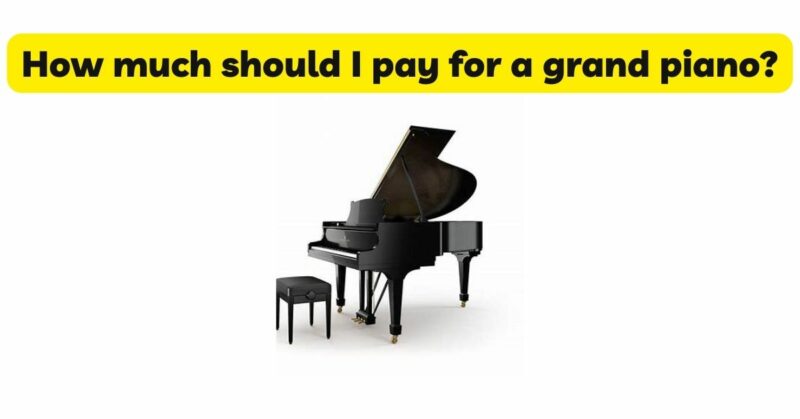Aspiring pianists and music enthusiasts often find themselves confronted with the question: “How much should I pay for a grand piano?” Determining the ideal price range for a grand piano involves careful consideration of various factors, including brand reputation, size, craftsmanship, materials, condition, and personal requirements. In this article, we will explore these elements and provide insights to help you navigate the piano market confidently and make an informed decision regarding the price you should be prepared to pay for a grand piano that meets your musical aspirations and budget.
- Brand Reputation and Pricing: The reputation of the piano manufacturer plays a significant role in determining the price range. Well-established and esteemed brands, such as Steinway & Sons, Bösendorfer, and Yamaha, often command higher prices due to their long-standing history, meticulous craftsmanship, and commitment to quality. These brands have become synonymous with excellence in the piano world, leading to higher price tags. However, it is essential to note that there are also reputable mid-range and boutique brands that offer excellent grand pianos at more affordable price points.
- Size and Model Considerations: The size and model of a grand piano are key factors influencing its cost. Grand pianos come in various sizes, ranging from baby grands (less than 5 feet) to concert grands (over 9 feet). Generally, larger grand pianos have higher price tags due to their larger soundboards, longer strings, and increased tonal richness. Concert grands, being the largest and most prestigious, are typically the most expensive. However, it is crucial to strike a balance between the desired sound quality and considerations such as available space and budget limitations.
- Craftsmanship and Materials: The craftsmanship and materials used in constructing a grand piano have a significant impact on its price. Fine grand pianos are meticulously crafted by skilled artisans who pay meticulous attention to detail, resulting in superior sound quality, durability, and overall instrument performance. Premium materials, such as high-quality woods for the piano case, soundboard, and strings, contribute to the instrument’s tonal excellence. As a result, grand pianos made with exceptional craftsmanship and high-end materials command higher prices.
- New vs. Used Grand Pianos: Deciding between purchasing a new or used grand piano is a significant consideration when determining the ideal price range. New grand pianos offer the advantage of being in pristine condition, carrying manufacturer warranties, and incorporating the latest advancements in design and technology. The cost of new grand pianos can vary widely, ranging from several thousand dollars for entry-level models to several hundred thousand dollars for top-tier brands and concert grands. On the other hand, used grand pianos, if well-maintained, can provide excellent value for money, with prices ranging from a few thousand dollars to tens of thousands, depending on factors such as age, condition, and brand reputation.
- Additional Considerations: Several additional factors can influence the price range for a grand piano. These include regional market variations, exchange rates, supply and demand dynamics, and any additional features or customization options. For example, pianos equipped with advanced player systems, such as self-playing mechanisms or digital recording capabilities, may command higher prices. Personal preferences, such as the aesthetic design or historical significance of a particular instrument, may also affect the price range. It is crucial to conduct thorough research, consult with experts, and compare prices from different sources to ensure a fair assessment of the ideal price range.
- Budget Considerations and Value for Money: Ultimately, the ideal price range for a grand piano should align with your budgetary considerations and the value you expect to derive from the instrument. It is essential to establish a realistic budget based on your financial circumstances and musical goals. While it is tempting to opt for the highest-priced grand piano, it may not necessarily be the best fit for your needs. Striking a balance between quality, affordability, and value for money is key. Assessing the craftsmanship, sound quality, reputation, condition, and long-term investment potential of the grand piano will help you determine the price range that offers the most optimal combination of these factors.
Conclusion: Determining the ideal price range for a grand piano requires a comprehensive evaluation of various factors, including brand reputation, size, craftsmanship, materials, condition, and personal requirements. Striking the perfect balance between quality and affordability is essential. By conducting thorough research, consulting with experts, and considering your budgetary constraints and musical aspirations, you can make an informed decision regarding the price you should be prepared to pay for a grand piano. Remember, it is not solely about the price, but rather the value and satisfaction the instrument will bring to your musical journey.


